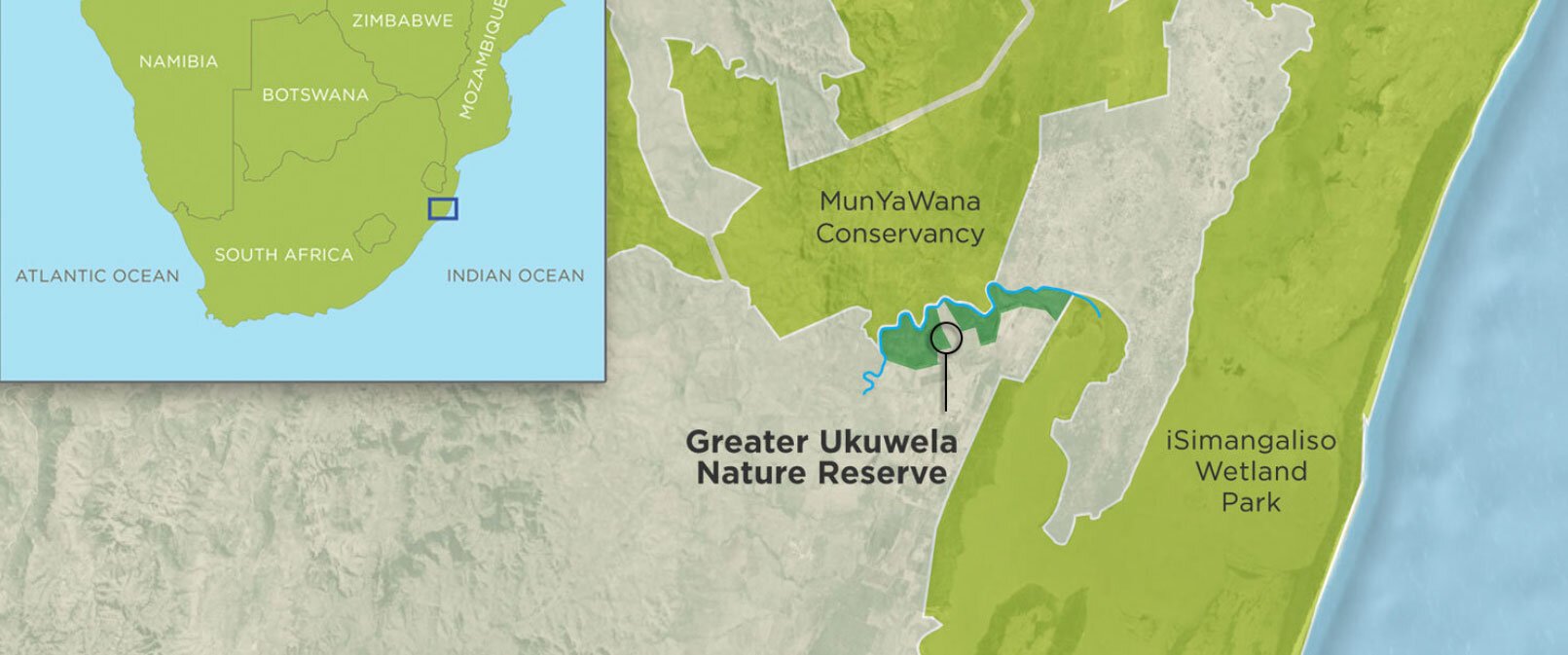CELEBRATING ANOTHER YEAR AS A DECLARED NATURE RESERVE
It’s the Greater Ukuwela Nature Reserve’s birthday this month!
Celebrate this milestone by reading more in our latest blog about the importance of Ukuwela as a wildlife corridor, connecting both habitat and people together, to save threatened species.
The sun setting over Greater Ukuwela Nature Reserve.
The 27th of May 2024 marks a significant milestone for the Greater Ukuwela Nature Reserve. This month we are celebrating the third anniversary since its official legal declaration as a Nature Reserve, which granted it the highest level of legal protection in South Africa. To visit Ukuwela today is to see, feel and breathe the tangible impact of our mission – saving and restoring habitat to save threatened species.
The Greater Ukuwela Nature Reserve (Ukuwela for short) is nestled within a biodiversity hotspot between two protected areas, the iSimangaliso Wetland Park, a UNESCO World Heritage site, and the Munyawana Conservancy. Ukuwela forms a wildlife corridor preserving the possibility to connect over 356,000 hectares (more than 880,000 acres) of vital habitat on South Africa's Elephant Coast.
Location of the Greater Ukuwela Nature Reserve in KwaZulu-Natal, South Africa.
Ukuwela, as a wildlife corridor, is working to tackle the most immediate cause of extinction on our planet: habitat loss. The proven solution to the extinction crisis is the protection and expansion of wild spaces in areas rich with biodiversity. By saving and restoring Ukuwela's grasslands, forests and fragile wetlands, we are not only giving wildlife a chance at a wild tomorrow but also using nature as a solution to mitigate climate change and provide added resiliency for people and wildlife.
From habitat restoration initiatives to community-based conservation projects, our work is part of the hope-filled regeneration and rewilding movements. At the heart of this lies the conviction that not only can we halt deforestation, habitat loss and biodiversity decline – but we can also begin to reverse these trends and restore stability to our planet
We will say it again, because truly it is so inspiring -
we can restore Nature!
That is what gives us hope, and we can see this hope in action at Ukuwela. What you see now is not a deforested farm but a functioning wildlife reserve, home to over 1240 species…and counting! On what was formerly deforested and degraded farmland, devoid of many native species, today you can easily spot zebra, impala, giraffe and other equally amazing ‘little things’ from dung beetles to termites, butterflies, wildflowers, and recently discovered forest spiders. Check out our video below, celebrating Ukuwela!
How did this all come together to create a new wildlife reserve in less than a decade?
It took hard work and concerted conservation action, requiring support from thousands of individual donors, and a driven team of people with different talents and backgrounds, all applied with singular focus to protect and restore nature. Our systematic approach can be summarized in parallel steps we took to PROTECT, RESTOREand REWILD nature.
We first protected Ukuwela’s habitat through land purchases, and by teaming up with conservation-minded neighbors who voluntarily included their private land to stitch together the reserve. We then hired a team of rangers, which has grown from 4 to 8 strong, patrolling day and night and helping manage the land.
Next, work began restoring Ukuwela’s tapestry of ecosystems: from wetlands to mixed grasslands and forest. Our team rolled up their sleeves to manually combat the proliferation of invasive alien species, which pose a significant threat to native wildlife and plants. We created an entire full-time (and all female!) ecosystem restoration team, the Green Mambas, who remove alien plants every day, while supporting their families thanks to their new jobs in conservation.
And the most inspiring step: rewilding. Once Ukuwela’s habitat was protected and major alien plant infestations tackled, we could then begin reintroducing native species that had long been absent. Many volunteers and donors have supported this work, and personally witnessed the first giraffe, zebra, impala, wildebeest, reedbuck, waterbuck, nyala and kuda releases!
Nature then, once protected and freed from alien plants, gets to work restoring herself. You will see this today at Ukuwela in each new impala calf, zebra foal and newly spotted bird species. Nature, when given a chance, will regenerate.
PROTECT: The Ukuwela Rangers on a snare patrol.
RESTORE: The Green Mambas - our ecosystem restoration team.
REWILD: The beautiful wetland that is part of the Greater Ukuwela Nature reserve - a biodiversity hotspot!
American environmentalist, activist and author, Paul Hawken, explains that regeneration “weaves justice, climate, biodiversity, and human dignity into a seamless tapestry of action, policy, and transformation that can end the climate crisis in one generation.” We see that directly in our work at Wild Tomorrow at the Greater Ukuwela Nature Reserve. By restoring nature, we are taking climate action by restoring ecosystems so they can absorb carbon from the atmosphere. We are creating jobs in conservation – dignified work that supports our wider community and alleviates poverty. And we are reconnecting people and hearts to nature, showing that it is possible to create hope again by being part of the rewilding movement, protecting wildlife and wild places.
It’s truly an amazing comeback story for nature. It took concerted conservation action, requiring support from thousands of individual donors, and a driven team of people with different talents and backgrounds, all applied with singular focus to protect and restore nature.
Let’s say it together, Happy Birthday Ukuwela!, as we rejoice in the beauty of this very special wild place. Thank you to everyone who has been a part of this story.
One of Ukuwela’s giraffe calfs - each new birth on the reserve is proof that nature will regenerate!
“To restore stability to our planet, therefore, we must restore its biodiversity, the very thing we have removed. It is the only way out of this crisis that we ourselves have created. We must rewild the world!”
- David Attenborough, A Life on our Planet.






